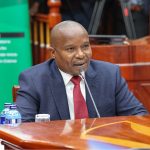Various agencies are consolidating efforts to protect gains made as the government increases its tempo of eradicating illicit alcohol and drug abuse in the country.
Deputy President Rigathi Gachagua stated that these efforts are guided by stringent measures adopted in March 2024.
Gachagua emphasized the government’s unwavering resolve to suppress the manufacture, distribution, sale, and consumption of illicit brews.
Speaking during a high-level multi-agency meeting at the Official Residence in Karen, Gachagua discussed the implementation of government directives on the eradication of illicit alcohol, drugs, and substance abuse.
The forum was attended by Principal Secretaries Raymond Omollo (Internal Security and National Administration), Harry Kimtai (Medical Services), and Terry Mbaika (Devolution), alongside top government officials from the Kenya Revenue Authority and regulatory bodies like the Kenya Bureau of Standards.
Since March, police have conducted 65,488 raids on liquor outlets. According to PS Omollo, as of June 30, 2024, County Security teams had arrested 30,675 people and seized 358,000 litres of chang’aa, 2.7 million litres of kang’ara, 8,000 litres of ethanol, and 389 shisha bongs.
The Ministry of Health has issued directives to all Level Three and above hospitals to establish wards for the rehabilitation of persons affected by substance abuse.
DP Gachagua noted that the 25 stringent directives announced by the government on March 6, 2024, to curb illicit brew, drug, and substance abuse have been effective, with the nation registering significant gains following the fresh vetting of alcohol manufacturers.
“It is a huge win for this administration with zero cost. This is a war we cannot relent because it is good for the country and has been successful,” he stated.
Gachagua urged state agencies tasked with combating drug abuse to take responsibility and eliminate the menace. He praised the County Security teams for their achievements but asked security officers to enhance surveillance at border points to prevent the entry of contraband goods, such as illegal ethanol used in manufacturing second-generation alcohol.
“The measures have been effective. Families have been restored and we are getting back our country to sobriety,” he said.
The meeting included heads and representatives from the Ministry of Health, the Pharmacy and Poisons Board, the Anti-Counterfeit Authority, and the Office of the Attorney-General.
The Pharmacy and Poisons Board reported that it had inspected 408 premises and is prosecuting nine individuals for non-adherence to good pharmaceutical practices.
The board has also closed 150 premises and seized 325 cartons of medicines. Additionally, it is developing guidelines to enhance fines and forfeiture of confiscated medicines by the courts.
The State Department for Internal Security and National Administration announced its proposal to amend the Alcoholic Drinks Control Act to provide for traceability of raw materials and end products throughout the value chain.
This proposal is part of the Government’s Omnibus Bill, currently before the Attorney-General.
These changes underscore the government’s commitment to improving service delivery and ensuring processes are efficient and user-friendly for all Kenyans.





